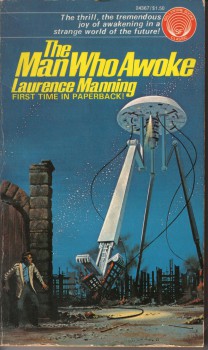A Review of The Man Who Awoke, Plus a Giveaway
 The Man Who Awoke
The Man Who Awoke
Laurence Manning
Ballantine (170 pgs, $1.50, 1975)
Back in February, our editor John O’Neill featured Laurence Manning’s The Man Who Awoke in one of his Vintage Treasures posts. I first read the book sometime around the summer (I think it was summer) of 1981 or 1982. I was in high school and had picked up a copy at a local used book store. When I mentioned in the comments that I’d been thinking of rereading it, John graciously offered to let me do a review. I’d like to thank him for the opportunity.
It had been on my mind recently when I read an ARC of Michael J. Sullivan’s Hollow World. Then I attended ConDFW this past February, where the charity book swap had dozens of paperbacks from the late 70s and early 80s in excellent condition. Among the titles I picked up was a first edition of The Man Who Awoke.
The novel was originally serialized in five parts in Hugo Gernsback’s Wonder Stories in 1933. The first part was included in Isaac Asimov’s anthology Before the Golden Age, another book I need to reread. I had enjoyed the first installment, so when I came across the paperback of the whole novel, I snatched it up and dashed home with it, after properly paying for it of course.
The story concerns Norman Winters. He’s a wealthy scientist who develops a method of putting himself to sleep through a process very much like hibernation. I don’t know if this is the first use of what would later come to be called suspended animation, but it had to be one of the earliest. I’ve not read H. G. Wells’s When the Sleeper Wakes, so I don’t know the mechanism Wells used. Manning has his protagonist use this device to search for meaning and happiness in the future.
In the first story, “The Forest People,” Winters places his apparatus in a chamber deep underground, and with the aid of a timer, sleeps for a few millennia, waking in 5000 A.D. When Winters comes out of his chamber, he discovers that the world has reached a state in which humans live in small villages, using trees to supply almost all their needs. Most of the world is covered by forest, and open grasslands are anathema. The time Winters comes from (our present age) is known as the Age of Waste.